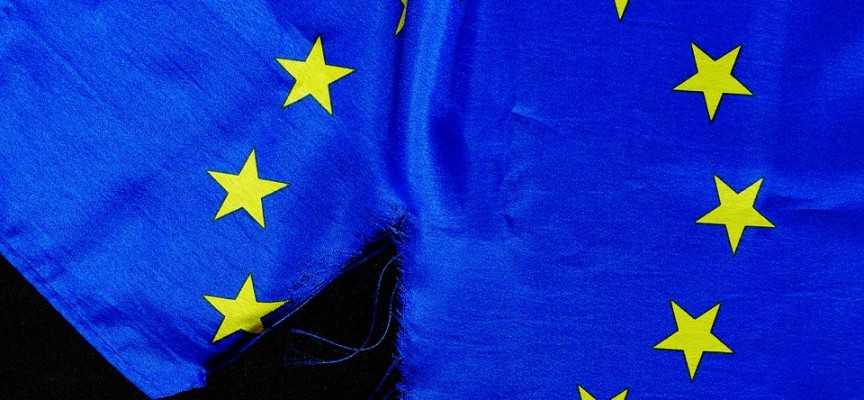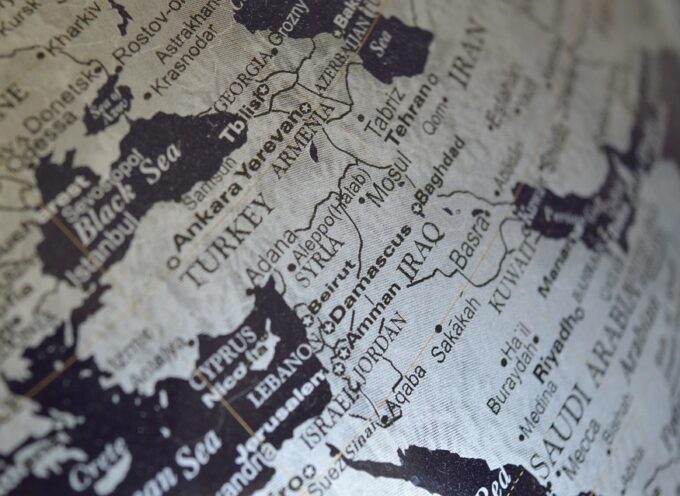On June 23, the citizens of the U.K. voted, by a margin of 52% to 48%, to leave the European Union. Immediately following the vote, global markets plunged—with the Dow Jones Industrial Average falling by 611 points and the NASDAQ having its worst day since 2011—and international politicians and media scrambling to interpret Brexit and its implications for the U.K. and other nations.
Proponents of “Brexit,” as Britain’s exit has been nicknamed, were elated. Nigel Faragee, head of the U.K. Independence Party, compared Brexit to a new day dawning. Opponents were devastated. Keith Vaz of the Labour Party said, “This is a crushing decision; this is a terrible day for Britain and a terrible day for Europe. In 1,000 years, I would never have believed that the British people would vote for this.”
Although American evangelicals might think Brexit has little or no significance for them, the opposite is true: the U.K.’s decision to exit is something that affects Americans and to which we should pay close attention. Here are three reasons we should care about Brexit:
- The Brexit Situation is Similar to our American Situation
The factors surrounding the Brexit decision are complex and multi-layered, but at the heart of them is a wrestling match between two competing visions for the U.K.: on the one hand, there are proponents of a sort of global cosmopolitanism who wish to stay in the EU and who often stress the benefits of global trade and multiculturalism. On the other hand, there are proponents of a populist nationalism who want the U.K. to go it alone, and who emphasize the cultural identity and social needs of their own nation.
While leaders of both visions focused on a number of factors, it was anxiety about immigration that tipped the balance. The UK Independence Party—who led the movement to have a referendum on leaving the EU—repeatedly warned British citizens that the EU forces its member countries to allow free movement and labor within its bloc, meaning that millions of immigrants from Africa and the Middle East would continue to pour into Britain, taking their jobs and changing their culture. Unfortunately, Brexit politicians and proponents sometimes used rhetoric that is xenophobic and borderline racist.
Perceptive commentators have immediately drawn a comparison between Brexit and American populism. If nothing else, the 2016 election cycle has forced an inconvenient reality out into the open: many Americans sense that our cosmopolitan political leaders and multi-national corporations are not very concerned for their welfare. In fact, the campaigns of Donald Trump and Bernie Sanders rode on the back of lower-class and lower-middle-class citizens for whom globalization, free trade, and immigration are economic stressors and cultural negatives.
- Brexit is Affecting our Presidential Race Already
Brexit has made an immediate impact on the 2016 election cycle; Donald Trump applauded the Brexit decision as an instance in which a nation was guarding its borders and taking its country back. “Come November,” he said, “the American people will have the chance to re-declare their independence. Americans will have a chance to vote for trade, immigration and foreign politics that put our citizens first. They will have the chance to reject today’s rule by the global elite.”
In response, Hillary Clinton argued that Trump’s applause is yet another piece of evidence that he is unfit for the Presidency. She pointed out that Trump made his comments about Brexit while enjoying the grand opening of one of his luxury properties; in other words, while Trump purports to care for the lower and middle-classes, he cares only about himself.
- We Must Respond to the “Make American Great Again” and “Feel the Bern” Movements
It is no secret that the surprises of the 2016 election cycle are caused in no small part by concerns about globalization, free trade, and immigration. These concerns, voiced by ordinary Americans, are the main reason so many Americans want to “Feel the Bern” or “Make America Great Again.”
When Trump and Sanders began to rise in the polls, many of us didn’t take their supporters seriously. We thought that this was early-election-season-silliness which would soon dissipate. Or, we were taken aback by the crudity and ugliness that sometimes was displayed. So we made light of it or even made fun of it.
But we should not combat this sort of populism by mocking and demeaning it; instead, we should address the problems it has brought to light. Globalization, trade, and new technologies have contributed to the economic stress and cultural dislocation that many of our fellow citizens are experiencing. While we may benefit from globalization, they do not. We get inexpensive landscaping, cheap labor (economic benefits), and great take-out food (cultural bonus), while they get job competition (economic stress) and neighbors who do not speak English (cultural dislocation).
Those are very real concerns, and it will not bode well for American citizens or politicians to ignore the concerns. We must address the economic stress and cultural dislocation. We must find a middle way between isolationist nationalism (perceived as “building walls to keep out Asian, African, Mexican, and South American immigrants, in order to make ourselves wealthy by keeping them poor”) and global cosmopolitanism (perceived as “allowing the upper class to benefit from immigration and globalization while the lower and lower-middle classes to get little or nothing”).
Together we must find a way to mitigate the negative effects of globalization and trade on those who do not benefit. If we do not, we will be pouring gasoline on the fire of populist anger and resentment and, more importantly, passing up an evangelical opportunity to love our (populist) neighbor by helping find solutions to his very real problems.
Subscribe
Never miss a post! Have all new posts delivered straight to your inbox.








It would be helpful for me to see specific data on how globalization is actually harming the working class, beyond just challenging the xenophobic and nationalistic values of some.
David, yes. I don’t have any specific data on hand, but I know there is some available. For example, the way globalization has caused a change in the “skill sets” that are needed in society. This is connected with free trade and immigration. A lot of the hard labor and sweat equity jobs are going to immigrants or overseas to other countries, and in exchange the US jobs that need filled require high-level communication skills (both speaking and writing), emotional IQ, tech knowledge, etc. Any many American men who are in their 40s, 50s, and 60s experienced this shift in a painful way that hurt them economically and sometimes made them feel inadequate to support their families or contribute to society.
Bruce,
Watching the Brexit aftermath reports last night and hearing the potential for other EU countries to follow the UK’s lead, I couldn’t help but wonder about implication for gospel penetration. It seems that one positive factor of globalization has been greater access to the world with the gospel. I wonder if the rise of isolationist policy from nations like the UK will leave us with a world where access to nations for missionaries is much more restricted?
Rick, that is a great question. Not sure of the answer.
If you Pastor a local church you don’t need data. They walk through your doors daily. With real needs, lost jobs, and little hope. Great article Bruce! You touched on the issues I’m having to face every day. People are hurting and angry. Never a good combination for rational thinking.
I am a German living in the UK, married to a Zimbabwean. I am very critical of the EU but would have voted for Remain if eligible. I believe it is the worst time for Brexit to happen, given the world’s political situation. I also think that Angela Merkel’s emotionally driven refugee policy made Brexit more likely.
However, it is a fallacy to think that free movement would have lead to millions of African and Middle Eastern people flooding the UK. It applies only to EU citizens. Granted, once those people become citizens, they may participate in free movement, but that would take many years. British underprivileged people are in general fed up with especially Muslim immigration from their former colonies (nothing to do with EU really) and recently joined Eastern European countries such as Romania and Bulgaria. The largest minority group in the UK are the Polish, by the way. But yes, Brexit now gives legitimacy to racism that has been brewing for a long time.
Martin, thank you for weighing in. We’ve only had Americans commenting on the post so far. Thank you for illumining the conversation.
Sadly I admit that I am too prone to “pick a side” whenever I read of such circumstances as the “Brexit”situation. I really appreciate you always seeking out how believers can benefit the gospel no matter how these state of affairs play out. Great post!
Thanks Geoff!
Dr. Ashford,
This is an amazing piece showing how nuanced the whole situation is, in Britain, in America, in greater Europe, and the rest of the world.
However, you show the failings of our current policies and ideologies and post an open ended question with no resolutions. How would you advise us to proceed?
Jason, great to hear from you. Thank you. Yes, this article is left open-ended, but over the next few months and years, I will be posting articles about the way forward. One thing I’ll mention is that our society tends to view “the individual” and “the government” as the only two actors in society, forgetting about other important actors such as family, church, community organizations, business, charity, and so forth. And when you isolate the individual and interface him with government alone, there will be economic and cultural problems. But when you breathe new life into those other actors (the so-called mediating institutions or middle layers of society), you have the chance for society to begin to flourish again. That is one important piece, among others, of the way forward.
It might be useful to think of the Brexit vote as the warning siren before the tsunami. The major crisis that is almost upon us will manifest itself at the Republican and Democratic national conventions. The Republicans may be ruined if they nominate the faltering Donald Trump, and ruined if they don’t. The Democrats’ attempt to coronate the egregious Hillary Clinton will be massively opposed by the #Bernie or Bust faction. Cleveland and Philadelphia may almost literally become battlegrounds as passions of the sort implied by Skip Cook’s comments, above, run high.
In the aftermath, our two-party system may collapse as Americans disgusted by decades of having to choose the lesser of two evils begin to demand better choices. And the winner who is sworn in on January 20, 2017 is going to be under incredible pressure to deliver on his or her campaign promises.
Good post, Bruce! Very thought provoking! And Roger, those, too are very interesting thoughts! Maybe we would be better off, given the situation,
if we got rid of the 2-party system.
Marcia, I agree that Americans should consider a multi-party system. There are some challenges that come with having a multi-party system, but also some significant positives such as the fact that many Americans might finally be able to join parties that really represent their beliefs and interests.